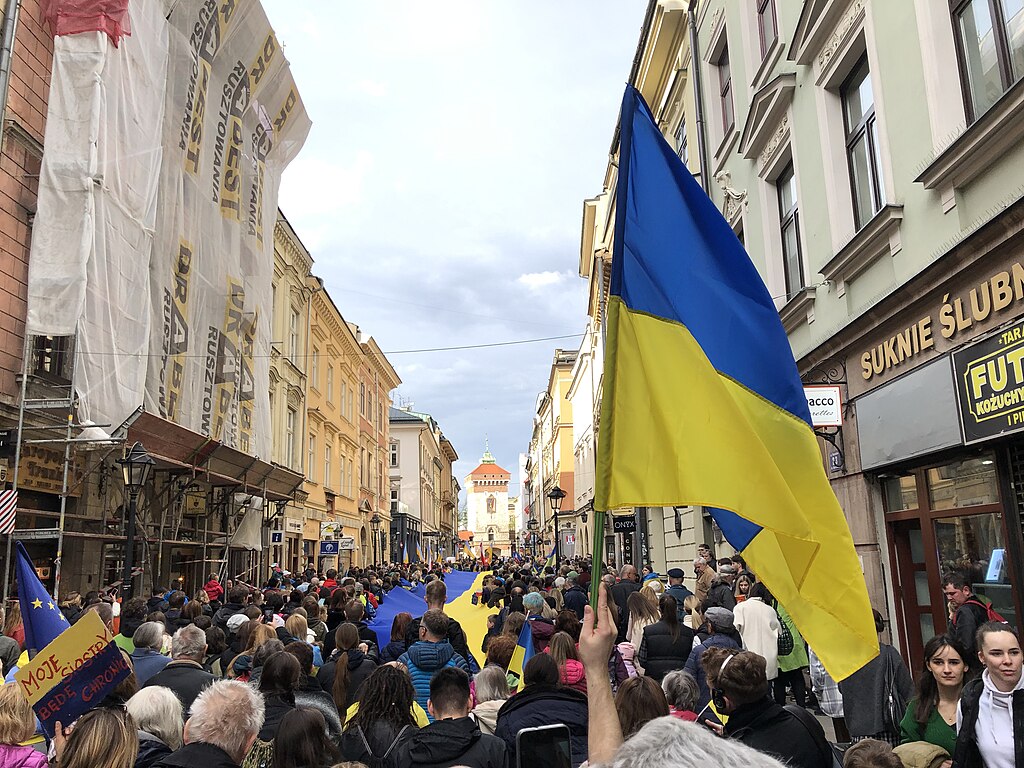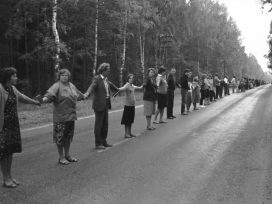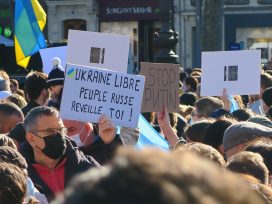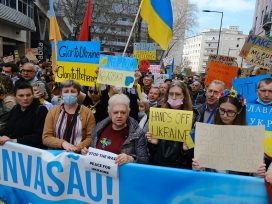Europe’s second chance
Solidarity with Ukraine has created strong momentum for greater European integration. But the challenges facing the Union are essentially geopolitical: the condition of any European rebirth is a radical change in relations with the Global South. Part of the series ‘Lessons of war: The rebirth of Europe revisited’.
It would be beside the point and somewhat hypocritical to dwell on how badly the two titans of European philosophy – Jürgen Habermas and Jacques Derrida – got it wrong in 2003. After all, their illusions were also ours. We too wanted a deeper, post-national European Union and a transnational public sphere; and we too anticipated the emergence of a European federation as independent geopolitical actor.
The differences lay in the (not insignificant) details. The criticism of the United States was too one-sided for us. Russia, on the other hand, was not criticized – even though, three years into Putin’s first presidency, it was clear that the tradition of despotism had returned. To make matters worse: the philosophers’ Kleineuropa did not include the nations of central eastern Europe, whose revolutions had after all ended the division of Europe, and which would finally become part of the EU a year after the manifesto was published. Moreover, we were concerned with issues of migration and ecology, which hardly played a role in the 2003 manifesto.
Since then, there has been great disillusionment with Europe. Britain has left the Union with suicidal stubbornness to chase old imperial dreams. In Hungary and Poland, the state has been captured by staunchly illiberal governments that instead of a deeper Union pursue a nationalist-identitarian, homophobic and, at its core, anti-Semitic schism.
In 2017, looking back on his country’s EU accession, the Hungarian prime minister Viktor Orbán proclaimed that, ‘back then we thought Europe was our future, today we know we are the future of Europe’. This dark prophecy could come true if conservatives in France, Spain, Germany and Austria follow the example of their counterparts in Italy and Denmark and form coalitions with the ultra-right. Donald Trump’s rise to power has exposed the fragility of even allegedly consolidated, ‘classical’ democracies. But it was already clear at the turn of the millennium that the global democratic domino-effect had tipped over into reactionary nationalism and ruthless authoritarianism.
Trump’s potential return to power demonstrates just how dangerous Europe’s almost exclusive reliance on NATO is. The Franco-German initiative of Habermas and Derrida strengthened expectations of a common European foreign and security policy. First conceived as a defence union before morphing into an economically based and culturally underpinned hereditary friendship, the Franco-German axis was predestined to take the lead in this. But the tandem has weakened and the axis is now heavily imbalanced.This is largely because of German indifference – from Gerhard Schröder to Olaf Scholz – towards French plans for a ‘Europe that protects us’ (Emmanuel Macron), which lead ultimately to concerted diplomacy and a common army. The Franco-German tandem should also have expanded to become a ‘Weimar Triangle’ that included Poland, reflecting the country’s growing importance and the openness of the Union to the Baltic states, central eastern Europe and the Balkans. What is needed today is a political community that includes more than 27 EU member states and resists the imperialism of the ‘Russian World’.
The fatal trinity of pandemic, climate change and war has given the EU a second chance. Viruses and CO2 do not stop at borders; the necessary alignment of health and energy policy must be communitarised more than before, which will spill over into the dominant issues of fiscal and social policy. Putin’s attack on Ukraine has also brought about an unexpected unity; even Italy’s post-fascist prime minister Giorgia Meloni agreed to arms deliveries; ghost drivers like Viktor Orbán, who would usually have been eager to collaborate with Putin, have to hold back; and Serbia, an EU accession candidate, has moderated its Russophilia.
What was not achieved transnationally, namely the formation of a new type of federal state, may now be happening via intergovernmental coordination, as if guided by a Hegelian world spirit. Today, the European Union is more than a loose confederation of states. Serious exit desires have fallen silent, the euro has successfully endured a series of financial crises, supranational institutions such as the European Court of Justice sanction the dismantling of the rule of law in Hungary and Poland, and European public prosecutors attack the root of all evil: corruption.
But Europeans are becoming increasingly weary of absorbing the risks of multiple crises. Fears are spreading, approval of liberal democracy is declining, and nationalist-identitarian reactionaries are cashing in on the uncertainty everywhere. The criminal Ukraine war, which borders on the genocidal, has underlined the need for solidarity and cooperation; but the willingness to make sacrifices is likely to diminish, especially with continued inflation. If the US-Chinese conflict escalates, Europeans would probably be reluctant to get involved. A clearer, more concerted message by European leaders – less pathos and less patchwork – would certainly help and would be a topic for the ‘European public’.

Demonstration of solidarity with Ukraine in Kraków, Poland. Photo by Franek Vetulani, CC BY-SA 4.0, via Wikimedia Commons
Europe in the world
We ‘woke up in another world’ (German foreign minister Annalena Baerbock) long before 24 January 2022. Three central, interlinked issues were already on the table in 2003, but hardly received attention: first, the geopolitics of the Global South and the obstinate, ever more anti-western attitude of the ‘non-aligned’ states led by the BRICS countries; second, climate change and decline of species diversity, which only entered the general awareness with the Paris and Montreal conferences in 2015 and 2022; and third, mass migration to the northern hemisphere, intensified by man-made ‘natural disasters’.
Geopolitics, planetary boundaries and migration did not figure in Habermas’s and Derrida’s manifesto. They drew general, pacifist lessons from past world wars and genocides, but had no sense of the present and future characterised by these three developments. Let’s look at them more closely.
Today, post-colonial and anti-racist discourse frustrates the western view. The disregard, plunder and oppression that white Europeans (and North Americans) have inflicted on the global South run so deep that a political coalition of the ‘global West’ against the present-day imperialism of Russia and China cannot emerge. Nor is there a common front against the corrupt ruling classes of the South, which could not do their business at all had they not also been protected by the West. The US interventions after 1945, the arrogant neo-colonialism of France in Africa, the behaviour of western companies and agencies, and the wasting of funds for development dominate the South’s image of the West and make its promises seem hollow.
This is why attempts by the G7 to convince the BICS states that the aggression of their partner Russia runs counter to the principles underlying their own decolonisation and independence have been to no avail. Although many non-aligned countries have condemned Putin’s ‘special action’ in the UN General Assembly, business and diplomatic dealings with Moscow persist (as they also do in the case of NATO member Turkey and even EU member Austria). And while, wherever China is mentioned in the tricontinental world, independent observers report extortion and shameless neo-colonialism, dependence on Chinese investors is apparently already too great to be reversed (something that also applies to Greece, Italy or Germany).
US President Joe Biden and his European counterparts failed to break up this front at the last G7 and G20 summits; now they are rushing to India, Brazil and the African middle powers to promote at least partial alliances – and are shown polite disinterest at best. The non-aligned countries are not Putin’s cronies, but they want to avoid indirectly becoming war parties by supporting sanctions or arms deliveries. Their simple aim is to see a quick end to a war that runs counter to their interests – not just in secure and affordable food supplies, climate compensation payments and investments in economic transformation, but also in advancing their own regional interests and in the consolidation of domestic autocracies.
This means that the value-driven, rules-based foreign policy that began in 1945 and expanded globally in the 1990s under the banner of democratisation has lost its attraction. Across North Africa, South Asia and Latin America, authoritarian governments have little empathy for democracy movements whose suppression in Hong Kong they registered without regret, and whose defence in Ukraine they wish to have no part in. Brazil, South Africa and India can hardly pass as democratic role models. But how should one object when 35 of the 50 authoritarian states currently listed by Freedom House receive US military aid? And when the West continues to arm Saudi Arabia, which is waging a barbaric campaign of destruction in Yemen that has so far claimed far more victims than the war in Ukraine?
But there are also geopolitical opportunities in the current situation. African leaders are calling for a radical reform of the United Nations, which in their view has failed to deliver on its universal promises from the start. The power of the Security Council is seen as a particular anachronism, since it allows the five permanent members to overrule what in 2050 will become the world’s most populous continent, Africa – and indeed the majority of humanity. (Not to mention the total inability of the UN to enforce its mission in response to the Russian invasion of Ukraine.)
The African Union is therefore demanding a ‘charter review conference’ to completely revise the UN system. This process would be initiated by a ‘coalition of the willing’ constituting a two-thirds majority of the UN General Assembly, which under Article 109 of the UN Charter cannot be overruled by the Security Council. The big question, of course, is how China would respond to such plans, as the likely winner of the current global power struggle, whose imperial ascent has been enabled not so much by Russia’s war as by the West’s willingness to cooperate.
An alternative globalization
A reform of the UN Security Council would give Europe a permanent seat, allowing it to act as partner to Africa, and create the opportunity for a genuinely worldwide climate and environment policy. A policy that treats the Global South not merely as the source of the raw materials necessary for the decarbonization of the North, and as the provider of ‘ecosystem services’ in the form of protected rain forests and maritime zones, would thus become a consensual project of ecological, economic and socially sustainable development.
Globalization would not need to be reversed so much as re-started under the auspices of social and climate justice, allowing what in development policy is referred to as leapfrogging: direct entry into alternative energy sources, all of which are available in abundance, together with transition to green and blue economies, concepts that are no longer alien even in Africa.
Closely linked to this is the South-North migration that is currently affecting Europe and increasingly driving it apart, but which will above all shape Africa’s future. A radical change of course is called for here. Frequently proclaimed hopes of an ‘African century’ have too often been dashed by corruption and civil war, and the effect of development investments has been too small. The many European military interventions, whose number is just exceeded by those of Russian mercenary troops, have only made matters worse.
Demographers now expect the continent to be home to 2.5 billion people by 2050. The vast majority of them will be of youthful age and in search of meaningful and permanent work. Demography will be Africa’s fate if closer European-African cooperation fails to prevent young people from emigrating en masse across the Mediterranean. Current European (and US) migration policy is purely protectionist and geared solely towards economic self-interest. The alternatives are local employment opportunities, better education and health policies, equality for women, and an end to endemic corruption. Only then can Europe finally put an end to the mass deaths on its south-eastern periphery.
The Ukraine war has created a new momentum. There is at least a chance for a political community that transcends the current EU and expresses solidarity against Russian imperialism, as was recently the case for the threatened Moldova. Even before joining NATO and the EU, Ukraine can benefit from the security guarantees provided in the mutual assistance clause in Article 42(7) of the Treaty on European Union and receive the necessary funds for reconstruction. We are no longer under any illusions, and such plans will only come to fruition with the support of a youth that no longer needs to consider itself as the ‘last (and lost) generation’.
Published 14 July 2023
Original in English
First published by Eurozine
© Daniel Cohn-Bendit / Claus Leggewie / Eurozine
PDF/PRINTIn collaboration with
In focal points
Newsletter
Subscribe to know what’s worth thinking about.
Related Articles

The fall of the Berlin Wall, and not the human chain across the Baltics, is emblematic of 1989. But what if this show of unity had become iconic of communism’s disintegration? Could acknowledging Eastern Europe’s liberation positively reframe what Russia otherwise perceives as loss since the Soviet Union’s demise?

The ‘Trump–Putin deal’ again places Ukrainians in a subaltern role. The leaked contract with its fantasy $500 billion ‘payback’ has been compared to Versailles, but the US betrayal recalls nothing so much as Molotov–Ribbentrop.












